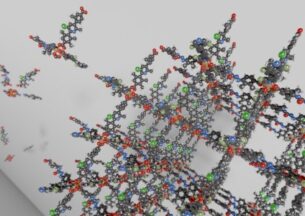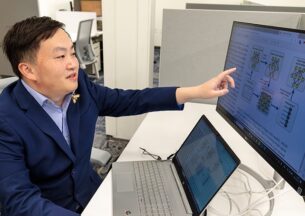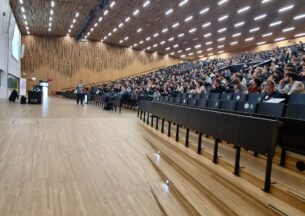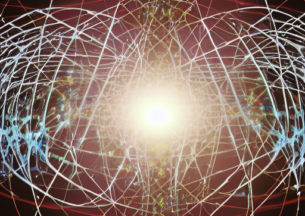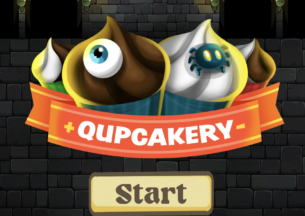Super.tech/EPiQC Quantum Computing Benchmark Receives Best Paper Award
Update: SupermarQ research received the Best Paper Award at The 28th IEEE International Symposium on High-Performance Computer Architecture (HPCA) 2022! The paper was one of four from EPiQC presented at the April conference.
Super.tech, a quantum computing startup co-founded by UChicago CS Professor Fred Chong and PhD alumnus Pranav Gokhale, announced the release of SupermarQ, a new, application-centric benchmarking suite for quantum computers. The product builds on research conducted with the Enabling Practical-scale Quantum Computing (EPiQC) collaboration, an NSF Expedition in Computing led by Chong, the Seymour Goodman Professor in the Department of Computer Science.
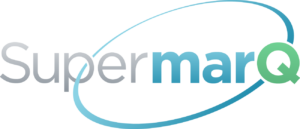 Benchmarking is a keystone of the computing industry and is especially important for quantum computing at this stage of development. SupermarQ is a suite of benchmarks that measure a machine’s performance on a range of applications. These applications mirror real-world problems in a variety of domains such as finance, chemistry, energy, and encryption.
Benchmarking is a keystone of the computing industry and is especially important for quantum computing at this stage of development. SupermarQ is a suite of benchmarks that measure a machine’s performance on a range of applications. These applications mirror real-world problems in a variety of domains such as finance, chemistry, energy, and encryption.
“Effective benchmarks can accelerate progress across the entire quantum ecosystem by stimulating investment in the right areas,” said Matt Langione, a partner and leader of the Deep Tech practice at BCG who specializes in quantum computing. Moreover, quantifying progress towards functional quantum computers is a matter of national security, as evidenced by DARPA’s recent solicitation of a Quantum Benchmarking program in mid-2021.
Many current benchmarks measure single operations or attempt to combine many aspects of performance into a single number. These approaches result in metrics which can end up comparing apples to oranges or lack a clear connection to commercial viability.
SupermarQ stands out in that it is motivated by real-world use cases –assessing how well a device can complete a given task, such as optimization, simulation, or error correction. Problem-solving with quantum computers requires different configurations depending on the problem, making some machines better at certain tasks than others. In this way, SupermarQ highlights the diversity of quantum computing architectures that exist today.
“We believe SupermarQ can become the go-to resource for quantum customers when deciding which device to use,” said Pranav Gokhale, Super.tech’s co-founder and CEO. “Our approach illustrates the importance of matching the device architecture to the use-case.”
Langione lends support to the Super.tech approach, stating “Application benchmarks are among the best tools to help companies determine which devices best meet their quantum computing needs.” Read more about the quantum benchmarking landscape in BCG’s latest white paper, here.
Another key attribute of SupermarQ is its scalability. The benchmarks use “cunning” mathematical designs, results of which will be verifiable even when quantum outpaces traditional computers. This cannot be said for other approaches, whose evaluation will become intractable when the inevitability of quantum supremacy is reached.
This benchmarking work is based on an academic paper authored by Super.tech employees and members of EPiQC. SupermarQ: A Scalable Quantum Benchmark Suite will appear in the IEEE HPCA 2022 conference.
Super.tech encourages readers to check out their web portal, where it is free to toggle between SupermarQ benchmark results and download materials for further exploration. For those interested in computing their own benchmarks, the SupermarQ codebase is open-sourced and can be run by anyone.
SupermarQ stands out from existing quantum benchmarking techniques. Chong, Super.tech’s co-founder and Chief Scientist, asserts, “We hope to drive a new way of thinking about quantum evaluation, one that’s based on capabilities, as quantum begins to be integrated into real-world workflows.”
Super.tech would like to thank P33 for their support in bringing this initiative to life.




